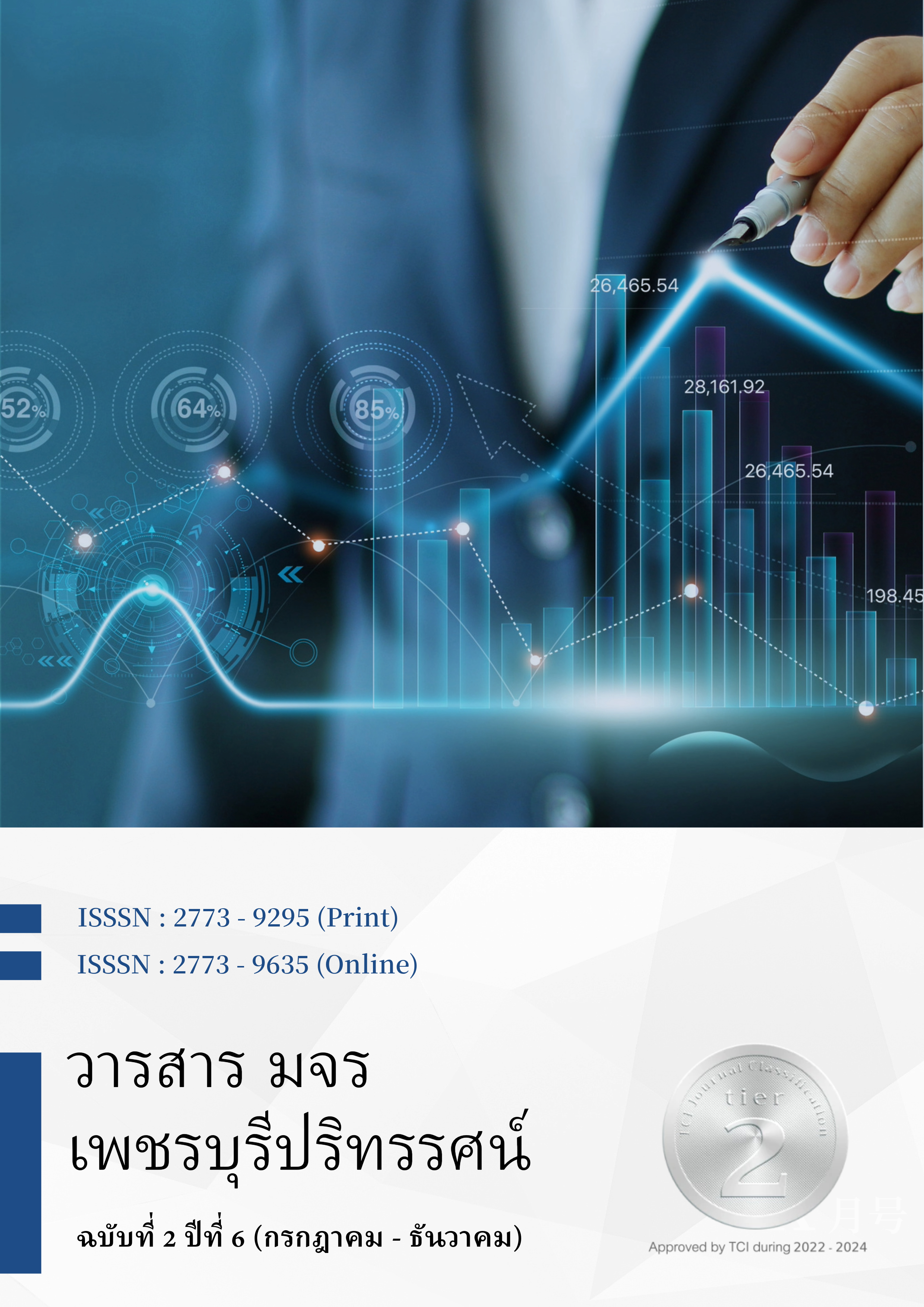TOURISM DEVELOPMENT IN PATTAYA CITY TO FOR SUPPORTING THE REOPENING OF THE COUNTRY AFTER COVID-19 PANDEMIC
Main Article Content
Abstract
This research objectives were (1) to study the situation of tourism development in Pattaya City to support the country's opening after COVID-19, (2) to study the problems and obstacles of tourism development in Pattaya City to support the country's opening after COVID-19, and (3) to study the recommendations for tourism development in Pattaya City to support the country's opening after COVID-19. The research was qualitative. Key informants included government leaders, tourism operators, tourism associations, community leaders, representatives from local community sectors, and 24 people from the general public were selected by purposive selection. The tool used for data collection was an interview form. The data was analyzed by descriptive summary.
The results found that (1) the situation of tourism development in Pattaya City to support the country's opening after COVID-19 was development and management of tourist attractions. The entire infrastructure had been developed. There was personnel development at all levels. There were measures to build confidence for tourists, focused on marketing activities throughout the year. There was public relations in both offline and online media. There were measures to help entrepreneurs and enhancing participation and integration of cooperation, (2) the problems and obstacles of tourism development in Pattaya City to support the country's opening after COVID-19 found that the budget was limited. There was concern and lacked of confidence in the economy, lacked of integrated work and participation, laws and regulations were not conducive to operations, labor shortage and lacked of necessary skills including public transport problems were lacking, and (3) the suggestions for tourism development in Pattaya City to support the country's opening after COVID-19 found that personnel skills development, infrastructure development in all dimensions, developed and revitalized tourist attractions ongoing marketing promotion activities, encouraged and opened the opportunity to participate, enhancing the potential of entrepreneurs and building confidence with tourists.
Article Details

This work is licensed under a Creative Commons Attribution-NonCommercial-NoDerivatives 4.0 International License.
References
กระทรวงการท่องเที่ยวและกีฬา. (2558). ยุทธศาสตร์การท่องเที่ยวไทย พ.ศ. 2558-2560. สืบค้นเมื่อ 12 มิถุนายน 2565, จาก https://www.mots.go.th/ewt_dl_link.php?nid=7114.
กิตติชัย วรรณไกรรุ่ง. (2561). ปัจจัยที่มีผลต่อการพัฒนาการท่องเที่ยวอย่างยั่งยืนของเมืองพัทยา. กรุงเทพฯ: คณะรัฐศาสตร์ มหาวิทยาลัยธรรมศาสตร์.
คณะกรรมการนโยบายการท่องเที่ยวแห่งชาติ. (2564). แผนพัฒนาการท่องเที่ยวแห่งชาติ (พ.ศ. 2564 - 2565). กรุงเทพฯ: สำนักงานปลัดกระทรวงการท่องเที่ยวและกีฬา.
ฉันทัช วรรณถนอม. (2552). อุตสาหกรรมการท่องเที่ยว.กรุงเทพฯ: สามลดา.
ณัฐอร เบญจปฐมรงค์ และชุติกา เกียรติเรืองไกร. (2565). การเปลี่ยนแปลงภาคการท่องเที่ยวไทย กับก้าว ต่อไปหลังเปิดประเทศ. สืบค้นเมื่อ 28 กันยายน 2565, จาก https://www.bot.or.th/
ดลยา จาตุรงคกุล. (2565). การวิเคราะห์ปัจจัยจูงใจในการตัดสินใจท่องเที่ยวเมืองพัทยา จังหวัด
ชลบุรี ภายใต้สถานการณ์การแพร่ระบาดของโรคติดเชื้อไวรัสโคโรนา 2019 COVID-19). วารสารเครือข่ายส่งเสริมการวิจัยทางมนุษยศาสตร์และสังคมศาสตร์, 5(2), 1-16.
นฤมล อนุสนธิ์พัฒน์. (2563). การปรับตัวทางเศรษฐกิจด้านการท่องเที่ยวในสภาวะวิกฤตโควิด -19 (Coronavirus Disease 2019 (COVID-19) ในประเทศไทย. วารสารวิชาการมนุษยศาสตร์และสังคมศาสตร์, 8(1), 1-25.
บริสุทธิ์ แสนคํา. (2563). พฤติกรรมการท่องเที่ยวของนักท่องเที่ยวชาวไทยหลังสถานการณ์โควิด-19. วารสารศิลปะศาสตร์และอุตสาหกรรมบริการ, 4(1), 160-167.
พงษ์พิพัฒน์ เสน่ห์ดี. (2565). “เมืองพัทยา”: ความท้าทายด้านการจัดการการท่องเที่ยวภายใต้ วิกฤตโควิด-19. วารสารมหาวิทยาลัยพัฒนาเชิงพื้นที่, 1(2), 1-10.
รําไพพรรณ แก้วสุริยะ. (2547). การท่องเที่ยวเชิงนิเวศและการท่องเที่ยวอย่างยั่งยืน. กรุงเทพฯ: กองอนุรักษ์ การท่องเที่ยวแห่งประเทศไทย.
ลงทุนแมน. (2564). นักท่องเที่ยวต่างชาติ สำคัญกับ เศรษฐกิจพัทยา มากแค่ไหน ?. สืบค้นเมื่อ 28 กันยายน 2564, จาก https://www.longtunman.com/27507.
วันชัย จึงวิบูลย์สถิตย์. (2560). ปัจจัยที่อธิบายความพร้อมของหน่วยงานหลักในการปฏิบัติตาม ยุทธศาสตร์ของแผนพัฒนาการท่องเที่ยวแห่งชาติพ.ศ. 2555–2559 เพื่อพัฒนาการท่องเที่ยวเมืองพัทยา จังหวัดชลบุรี. รัฐประศาสนศาสตรดุษฎีบัณฑิต สาขาวิชารัฐประศาสนศาสตร์ มหาวิทยาลัยชินวัตร.
ศันสนีย์ กระจ่างโฉม, กรวรรณ สังขกร และนิเวศน์ พูนสุขเจริญ. (2564). กลยุทธ์การปรับตัวของภาค การท่องเที่ยวในภาคเหนือตอนบนภายใต้วิกฤติการณ์การระบาดโควิด-19. วารสารวิชาการ มหาวิทยาลัยหอการค้าไทย มนุษยศาสตร์และสังคมศาสตร์, 41(1), 2-20.
ศูนย์วิเคราะห์เศรษฐกิจ ธนาคารทหารไทยธนชาต จำกัด (มหาชน). (2564). Ttb analytic ประเมินผลกระทบ โควิดภาคการท่องเที่ยวช่วงที่ผ่านมา. สืบค้นเมื่อ 25 กันยายน 2565, จาก https://www.ttbbank.com/th/newsroom/detail/travel-thailandafter-unlocking.
สำนักยุทธศาสตร์และงบประมาณ ส่วนยุทธศาสตร์การพัฒนา ฝ่ายยุทธศาสตร์และนโยบาย. (2562). แผนพัฒนาเมืองพัทยา (พ.ศ. 2561 - 2565). สืบค้นเมื่อ 15 มิถุนายน 2565, จาก https://www.pattaya.go.th/
Finn, J. D. (1962). Expectation and Educational Environment. Journal of Teacher Education, 42(3), 390.
McIntosh R.W. and Goldner C.R. (1986). Tourism Principles, Practices, Philosophies. New York: John Wiley & Son.
Mill, R. C. (1990). Tourism: The International Business. New Jersey: Prentice Hall.
Parasuraman, A., Zeithaml, V. and Berry, L. L. (1990). Delivering Quality Service: Balancing Customer Perceptions and Expectations. New York: The free press.
Pike, S. D. (2008). Destination Marketing: An Integrated Marketing Communication Approach. Burlington. MA: Butterworth-Heinmann.
Tourism Western Australia. (2009). 5A’s of Tourism. Retrieved May 3, 2022 from www.tourism.wa.gov.au/jumpstartguide/totb_5Asoftourism.html.


